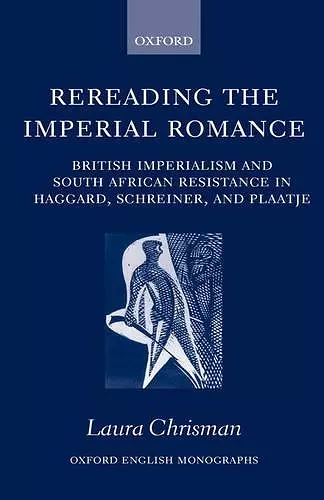Rereading the Imperial Romance
British Imperialism and South African Resistance in Haggard, Schreiner, and Plaatje
Format:Hardback
Publisher:Oxford University Press
Currently unavailable, and unfortunately no date known when it will be back

This book examines literary romance as a vehicle for the ideological contradictions of British imperialism in South Africa. Chrisman draws upon postcolonial theory and cultural materialism to discuss the imperialist Rider Haggard's fictional accounts of mining in King Solomon's Mines, and Zulu history in Nada the Lily, examining these novels as fraught responses to the introduction of capitalist modernity. She goes on to analyse the counter-narratives of metropolitan and African resistance of feminist Olive Schreiner and black nationalist Sol Plaatje. Exploring Schreiner's much-neglected Trooper Peter Halket of Mashonaland, Chrisman situates this book in relation to the violent creation of 'Rhodesia', the 1896-7 Shona uprisings, and contemporary criticism of Cecil Rhodes. In doing so, she shows how Schreiner's is a much more challenging example of anti-imperialist fiction than Conrad's Heart of Darkness, published two years later. Chrisman's discussion of Plaatje's Mhudi–the first black African novel in English–considers the book as a direct response to Haggard's imperialism and Schreiner's feminist theory. Locating the book through the politics and epistemology of the early ANC, she reveals how Plaatje challenges Haggard's misogyny and fatalistic historiography. Mhudi, she argues, is a novel whose nationalist and sexual politics are considerably more complex than has been recognized. Plaatje uses his narrative form to articulate both radical and liberal alternatives to white South African rule. Chrisman's book demonstrates how South Africa played an important if now overlooked role in British imperial culture, and shows the impact of capitalism itself in the making of racial, gender and national identities. This book makes an original contribution to studies of Victorian literature of empire; South African literary history; African studies; black nationalism; and the literature of resistance.
Chrisman's work draws on feminism, cultural materialism, and Marxism. She offers close studies of the works under discussion, a clear line of argument that is intelligently informed by the standard theories of imperialism and monopoly capitalism as well as more recent postcolonial and cultural theory, and an analysis of race and gender that never lacks a political dimension. * Victorian Studies *
The monograph is most remarkable in its scholarly attention to detail...This highlights the enormous strength of the study, which lies in its meticulous research and Chrisman's thorough effort to situate the texts within the debates and politics of their period. The footnotes, furthermore, offer a veritable wealth of information and references, making Rereading the Imperial Romance an excellent sourcebook on imperial studies in general. * Interventions, Vol. 4 *
Rereading the Imperial Romance is an important text for South African literary studies. Chrisman's nuanced reading of the interrelationship between history, politics and literary production provides fruitful scope for re-evaluating other marginalised writers and their interaction with colonialism. By shifting the centre of postcolonial studies onto Africa, Chrisman offers a valuable strategy for revisiting British Imperial literature. * Peter Midgley, H-SAfrica *
ISBN: 9780198122999
Dimensions: 227mm x 145mm x 19mm
Weight: 425g
252 pages